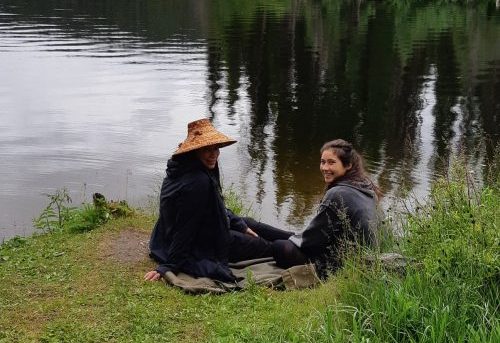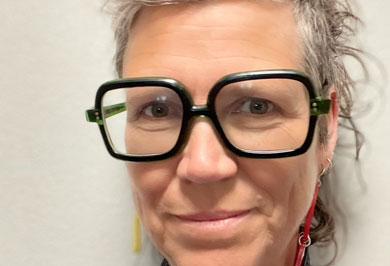PLEASE NOTE: Registration has closed for Earth Sense 2024. Please stay tuned to the IndigenEYEZ Facebook page for details about registration for next year!
EARTH SENSE: Land as Teacher
IN COLLABORATION WITH THE UNIVERSITY OF BRITISH COLUMBIA OKANAGAN
A hybrid training program starting September 2024 for anyone wanting tools and skills to mobilize land-based opportunities in their community

Coyote artwork by Sofia Auger Nybida
IN-PERSON GATHERINGS
Sept 27 - 29, 2024 & Jun 13 - 15, 2025
ONLINE MODULES
Nov 14, 2024, Jan 15, Feb 11, Mar 5, Apr 29, May 21, 2025
tmxʷulaxʷ
From the syilx language, tmxʷulaxʷ translates to 'land' in English, but when broken down, tmxʷulaxʷ means much more. The first part of the word refers to all living things, the second to in continuous cycles, and the third to of the soil.
From "Indigenous stories hold wisdom to help tackle modern challenges"
Social Sciences and Humanities Research Council
We all have a responsibility to care for the lands, waters, and communities that support us. As the climate changes, adaptation and innovation become critical
Climate change can feel overwhelming. We hear terms like “climate justice” in a settler context, but what does this mean for Indigenous peoples? We have collaborated with climate justice researchers at UBC Okanagan to bring our strengths forward.
Our captikʷł (stories) teach that change is inevitable and necessary, requiring a balanced and connected community.
Reconnecting on the land, rebuilding relationships, and opening ourselves to experience joy is how we can begin to address the massive aches we carry
Earth Sense is for Indigenous Peoples who work in community and dream of using land-based learning to strengthen connections to themselves, each other, and all beings. This training program is about lifting up our People who wish to build community on the land using the power of creativity and play as medicine. Our hope is that by the end of this program, participants will walk away with an expanded bundle of gifts and feel part of a web of land warrior changemakers.

CERTIFICATE PATHWAY AVAILABLE
Participants who join us for both in-person gatherings and all six online modules can apply for a Certificate of Completion.
Participating in all sessions is not required. We invite anyone who can join us when time and space allows.

Earth Sense will begin and end by coming together on the land.
In between our in-person gatherings, participants will join 6 online modules.
ONLINE MODULES
9:30 AM - 12 PM PST on Zoom
Connecting with the Elements
Thurs, Nov 14, 2024
Building safer and more inclusive learning spaces through the lens of the four elements
Getting Grounded
Wed, Jan 15, 2025
Activating our creativity, imagination, self-expression and confidence to take action
Breathing with the Land
Tue, Feb 11, 2025
Strengthening our spirit and deepening our relationship with land and place
Keeping your Fire
Wed, Mar 5, 2025
How can we show up for ourselves and each other?
Connecting Through Water
Tue, Apr 29, 2025
Uplifting and establishing a sense of community and connection
Bringing our Learning Home
Wed, May 21, 2025
Strengthening our capacity to share with our communities, loved ones and colleagues
ON THE LAND
Lighting the Fire
September 27 - 29, 2024
Bringing it Home
June 13 - 15, 2025
Our in-person gatherings will take place in syilx Okanagan homelands

FIRESIDE CHATS
Earth Sense participants will be invited to join IndigenEYEZ around the virtual fire for six Fireside Chats featuring guest speakers and storytellers sharing insights on land-based issues and revitalizing Indigenous ways of being and knowing
DATES TBD
Earth Sense was created to be an Indigenous-led and centered space for Indigenous peoples and settler relatives to come together on the land.
Indigenous peoples will represent a minimum of 75% of participants, while settlers will comprise no more than 25% of the group.
Meet the Facilitators

KELLY TERBASKET
Kelly brings the strengths of both her syilx Okanagan and European ancestry to her work as a leader. Through 30 years of on-the-ground engagement with community, Kelly came to see relationship breakdown as a common barrier to the success of programs and came to understand that revitalizing Indigenous ways is key to turning this around. She co-founded IndigenEYEZ as a means of supporting natural champions in communities to better respond to the impacts of colonization. Kelly is focused on the role of relationships in systems change and is sought out for her capacity to help deepen relations at a time when building connections across differences is essential. She has a BSW, Executive Coaching Certification, and extensive training in creative facilitation through Partners for Youth Empowerment (PYE Global). She lives in her family’s ancestral home on the Blind Creek Reserve in syilx territory in the Similkameen Valley.

SARAH SANDY
Sarah Sandy is a proud citizen of the Anishnabek Nation and member of Beausoleil First Nation, G’Chimnissing on beautiful Georgian Bay in William’s Treaty Territory. She works to decolonize approaches in education and leadership. She collaborates on land-based experiential program and curriculum design, evaluation, and community engagement processes. Over the last two decades, Sarah has worked with not-for-profit organizations both large and small, post-secondary institutions, and community-based initiatives on Indigenous youth leadership, community engagement, land-based recreation and education, and environmental stewardship. Sarah is a graduate student in Lakehead University’s Education for Change Program which focuses on Indigenous Education and Environment & Sustainability. She holds a BA in Indigenous Environmental Studies from Trent University and a Diploma in Recreation Enterprise from Langara College. Driven by a love of learning, love of the land and a spirit of adventure, Sarah is committed to creating programs and pathways for people and their communities to heal and to connect with the life and land that surrounds them.

CARRIE TERBASKET
Carrie has spent over 20 years involved in many circles advocating for her homelands, waters, and more-than-human relatives. Throughout her career she has always been a strong advocate for meaningful and direct leadership by her smelqmix community in the conservation arena throughout the Okanagan Nation and beyond. She is a strong advocate for centering Indigenous Youth and Creativity as the most meaningful and true path to change. Carrie is committed to naqsm’ist, an nsyilxcen word for “Many Becoming One”, by creating healthy relationships that facilitate respectful and inclusive movement free from colonial constraint. Carrie has a strong belief and value system deeply rooted in the protection of all tmixw and her work reflects that. Most importantly, Carrie is the proud mother of Madison, Liam, and Abigail.

DR. ASTRIDA NEIMANIS
Astrida Neimanis is a cultural theorist working at the intersection of feminism and environmental change. Her research focuses on bodies, water, and weather, and how they can help us reimagine justice, care, responsibility and relation in the time of climate catastrophe. Her most recent book, Bodies of Water: Posthuman Feminist Phenomenology is a call for humans to examine our relationships to oceans, watersheds, and other aquatic life forms from the perspective of our own primarily watery bodies, and our ecological, poetic, and political connections to other bodies of water. Astrida’s research practice includes collaborations with artists, writers, scientists, makers, educational institutions, and communities, often in the form of experimental public pedagogies. Her writing can be found in numerous academic journals and edited collections, artistic exhibitions and catalogues, and online media.
IndigenEYEZ is dedicated to strengthening connections between Indigenous Peoples and neighbours, and as such, have collaborated with UBC Okanagan to deepen discussions and build an understanding of how to build strong relationships that can lead to syilx-centric responses to systemic causes of climate injustices. Because this program is taking place and is rooted within unceded syilx territories - syilx perspectives and knowledges are centered. Additionally, we honour all Indigenous perspectives and welcome participants from across Turtle Island.
IndigenEYEZ, UBCO’s FEELed Lab, and Principal’s Research Chair in Communities, Justice, and Sustainability have come together to explore the concept of climate justice as it relates to Indigenous connections to place and community. There is a collective understanding amongst the project partners that the language of ‘climate justice’, as a blanket term, looks differently within syilx territory and thus requires a place-based / people-based approach. As such, the language of climate justice itself is insufficient to encompass syilx priorities. Further, Indigenous Peoples have long expressed concern for these topics as related to colonialism. The project partners collaboratively decided to have dedicated dialogue on these topics to explore perspective and relationship building needs in order to support a strong and relational foundation. Additionally, the Project Team would like to acknowledge with deep gratitude, the support and contribution of Dr. Onyx Sloan Morgan and for their ongoing involvement and belief in this project.
When we meet with our People on the land, the outcomes are immeasurable
Let's tap into the (re)generative power of the land as teacher
frequently asked questions
Click here to register for Earth Sense, or if you prefer to submit your registration verbally or via email, please contact Katie at (604) 842-5376 or katie@indigeneyez.com
Registration for the online modules is open
As a non-profit initiative we rely on funding opportunities and donations to continue our work growing the network of Indigenous changemakers. We are grateful for the financial support from the Vancouver Foundation's Thriving Indigenous Systems Fund and the University of British Columbia's Community University Engagement Support Fund for making it possible to develop and deliver Earth Sense.


